While you will find hundreds of laundry detergents in the market, not all of them are good. A huge chunk of them is not worthy of your penny. But how do you determine the worst laundry detergents for septic systems?
The criteria are faulty packaging, inconsistency, bad smell, poor performance, and so on. Using a substandard laundry detergent can damage your dress and septic system in the long run.
Considering these facts, I’ve listed the six worst laundry detergents for a septic system. After knowing about them in detail, you will understand why they are on this list.
How Laundry Detergents Can Harm Septic Systems
First, it’s helpful to understand precisely how laundry detergents can negatively impact septic systems. Here are some of the key ways that hazardous ingredients in laundry detergents damage septic tanks and drain fields:
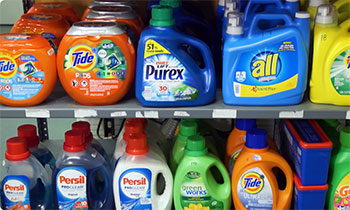
- Excessive suds – Many laundry detergents produce lots of suds, which can overload a septic tank, causing backups, slow drains, and plumbing issues. The suds may also transfer to the drain field and clog the system.
- Lack of biodegradability – Some detergent ingredients break down slowly and can accumulate in the septic tank, reducing its emptying capacity over time. Non-biodegradable substances may also clog pipes and fail to break down in the drain field.
- Harsh chemicals – Certain chemicals are corrosive and can degrade or corrode components of the septic system like pipes, pumps, and the septic tank itself. This leads to leaks, blockages, and system failures.
- Nutrient overload – Laundry detergents contain nitrogen and phosphates which, in excess, can overload and damage the biological processes in the septic system. This may cause malfunctions and service issues.
- Toxicity to beneficial bacteria – Many laundry detergents contain chemicals like bleach, antimicrobials, and fragrances that are toxic to the helpful bacteria needed in the septic tank and drain field. Killing these bacteria harms the system’s ability to treat waste.
Knowing which ingredients to avoid based on these damaging effects is the key to choosing an eco-friendly laundry detergent if you have a septic system. Next, we’ll explore the worst offenders.
Ingredients to Avoid
When selecting a laundry detergent for use with a septic system, there are certain chemical ingredients that should be avoided. Here are some of the most concerning ingredients commonly found in many major laundry detergent brands:
Surfactants
Surfactants are chemicals that reduce the surface tension of water to help cleaning agents penetrate materials more effectively. Two very common surfactants are especially problematic for septic systems:
- Sodium lauryl sulfate (SLS) – This surfactant generates very sudsy foam. The bubbles can overwhelm septic tanks and transfer to drain fields where they block infiltration. SLS breaks down slowly and is non-biodegradable.
- Nonylphenol ethoxylates (NPEs) – These surfactants are endocrine disruptors and are toxic to helpful septic bacteria. They break down very slowly.
Fragrances
- Perfumes and artificial fragrance chemicals are added to many laundry detergents. Many fragrances contain toxic chemicals like phthalates and other endocrine disruptors. They can kill beneficial microbial life in the septic system and contaminate groundwater.
Preservatives
- Preservatives like triclosan are added to laundry detergents to prevent the growth of bacteria. However, this includes the helpful bacteria needed in septic systems. This compromises waste treatment processes.
Bleaches
- Bleach (sodium hypochlorite) and other whitening agents like sodium percarbonate are corrosive to septic system components. They can kill beneficial septic bacteria.
Builders
- Builders like phosphates help remove mineral deposits but act as nutrients in septic systems, leading to algae overgrowth and system damage. Zeolite builders also solidify in septic tanks.
Dyes and Brighteners
- Artificial dyes and brightening agents like fluorescers can stain and contaminate groundwater and are generally non-biodegradable. Optical brighteners are known to be toxic to aquatic life.
Fillers
- Fillers like salt, clays, and alcohols bulk up laundry detergents but can harm septic system function. Salt is corrosive, clays solidify in septic tanks, and alcohols kill helpful microbial life.
The very ingredients added to improve detergent cleaning power are the same substances that frequently damage septic systems. When purchasing laundry detergent for use in homes with septic systems, products containing these ingredients should be avoided. Next, we’ll look at some specific detergent brands and products to steer clear of.
Which Laundry Detergents To Avoid?
- Woolite Darks Liquid Laundry Detergent
- Amway SA8 Liquid Concentrated Laundry Detergent
- Mrs Meyers Clean Basil Laundry Detergent
- Kirkland Signature Ultra Clean HE Plant-Based Laundry Detergent
- Tide Simply Pods +Oxi Liquid Laundry Detergent
- Arm & Hammer OxiClean Concentrated Liquid Laundry Detergent
Let’s find out why I have labeled them as the worst laundry detergent for septic systems.
Woolite Darks Liquid Laundry Detergent
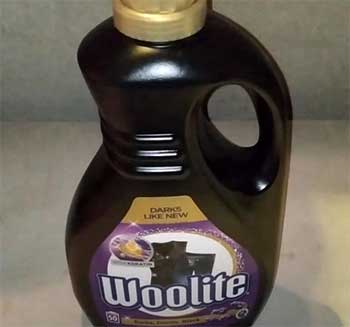
Woolite Darks detergent comes with attractive packaging. But the problem here is that its packaging quality is inferior.
Many people have said that their detergent bottle didn’t have a tight sealing.
As a result, a lot of liquid has spilled out.
Sometimes, the bottle is very puny, resulting in total damage during transit. Another problem with this liquid detergent is its consistency.
The viscosity of this liquid detergent is not consistent. It means you will find different fluid viscosity in different bottles.
You won’t find any scent in this detergent. So it smells bland after washing your clothes.
However, the worst thing about Woolite Darks detergent is its performance. It will fade your clothes’ color.
As a result, this is not safe for your septic tank system. Liquid detergents are generally harmful to a septic system; this one is worst because of its unnecessary foam.
Amway SA8 Liquid Concentrated Laundry Detergent
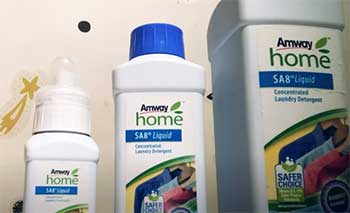
The main problem with this liquid laundry detergent is its liquid quality.
With a very thin liquid, its washability is below average and not effective.
Besides, you will need multiple cupfuls of detergents for washing clothes.
Mainly, it’s not cheaper, so you understand how much extra money you will lose every month.
Plus, the smell from clothes doesn’t go with one wash.
Another big problem with Amway liquid detergent is that it makes clothes rough. There is a huge possibility that your clothes will lose their softness after washing with this detergent.
Not to mention you won’t get any residual scent from the clothes. So, you might have to use an extra clothing conditioner.
The package does not have clear instructions for cleaning. So people get muddled. Many people have reported fake Amway detergents. So, beware of that.
Mrs. Meyer’s Clean Basil Laundry Detergent
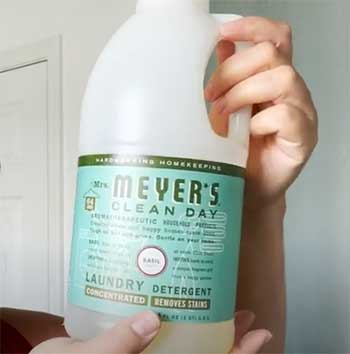
Mrs. Meyer’s laundry detergent contains many toxic elements harmful to the human body.
Especially people with sensitive skins can suffer from these destructive elements.
MIT, CMIT, etc., are some of the elements that can cause lunge toxicity and allergic reactions.
These chemicals are also detrimental to your septic tank system.
The fluid feels watered down, and its consistency is not the same in all bottles.
Mrs. Meyer’s claims to use essential oils for fragrance. But in reality, they use artificial fragrances to create scents. As a result, after washing clothes, the residual smell becomes sour.
At the same time, synthetic fragrances are dangerous for people with sensitive skin.
You should not use this liquid detergent powder if you have kids at home. It can be disastrous if your kid somehow comes in contact with it.
Kirkland Signature Plant-Based Laundry Detergent
A rotten smell is the main problem with Kirkland Signature liquid laundry detergent. You will get a smell like your clothes have been left for washing for a long time.
Besides, the scent is so strong that it doesn’t go away even after rinsing a half dozen times.
You might think the smell will go away when clothes dry. You can take the chances because I can assure you that it will only worsen.
Eventually, you will have to use a clothing conditioner to get rid of the smell. One more issue with this liquid detergent is its container.
The bottle is cheaply made, especially compared to its price. Your bottle might get damaged even before reaching your place.
Tide Simply Pods +Oxi Liquid Laundry Detergent
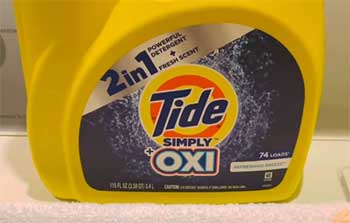
Tide Simply Laundry Detergent, as the name suggests, is just a detergent.
You will be disappointed if you expect any stain removal or color protection from it.
Instead, it might damage the color and crispiness of your clothes.
On top of that, it creates a lot of foam and becomes like a soap. The problem is, it sticks to your clothes even after a wash.
So, you might have to go back again and wash for a second time. And because it creates a lot of foams, it’s harmful to your septic tank too.
Many people have said they do not like the strong smell of Tide Simply Laundry detergent.
Arm & Hammer OxiClean Liquid Laundry Detergent
The last worst detergent on my list is Arm & Hammer liquid laundry detergent. It’s a cheap detergent by all means.
You won’t get a close result even after using multiple cupfuls of detergents for one load.
The price is lower, and so is the packaging. Many people have reported that they had got damaged products. But probably the bad smell is the worst problem with this detergent.
Your clothes will smell like rotten flowers if you use the recommended amount. Imagine the extra labor you will have to remove the smell.
Gain Laundry Detergent
Gain is also produced by Procter & Gamble and shares many similarities with Tide when it comes to harmful ingredients:
- Numerous artificial fragrance chemicals
- SLS surfactant
- Phosphate and citrate builders
- Whitening agents
- Fluorescent brighteners
- Toxic preservatives
Avoid all varieties of original Gain liquid and powder detergents. The Gain Flings pods also pose risks.
FAQs
Detergents with bleach or chlorine should be avoided as they can kill the beneficial bacteria that help break down waste in the septic tank. This includes detergents like powdered bleach, Clorox 2, and OxiClean.
Detergents with antimicrobial ingredients like triclosan should also be avoided. These can disrupt the bacterial balance in the septic tank.
Detergents that contain phosphates are problematic as they can promote the growth of algae and negatively impact the septic system over time. Common phosphate-containing detergents include many traditional laundry detergents.
Dawn dish soap is generally considered septic safe when used sparingly and in moderation. But it’s best not to pour large amounts down the drain at once.
Drain cleaners and harsh chemical products in general should be avoided as they can kill beneficial bacteria and potentially damage pipes or tank components. This includes products like Drano. Natural drain cleaners are a better option.
Tide Pods generally do not contain bleaches or antimicrobials so they are considered more septic safe than some liquid Tide detergents. But some homeowners associations still discourage their use to be safe. Using a phosphate-free, bleach-free liquid laundry detergent is the safest option.
Final Words
Nobody should buy substandard detergents with money to clean their favorite clothes. After reading my worst laundry detergents for septic systems list, I hope you will stay miles away from them.
However, I’ve used personal experience, customer reviews, and forum discussions to make a list. You are always welcome to share your own experience. Comment below and let me know.

Hello Clyde – What is your recommendations for septic safe laundry detergents. Thank you.